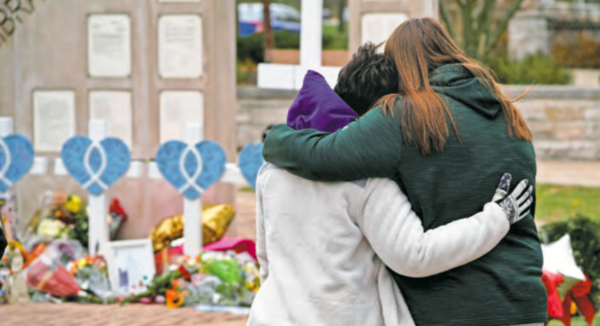By William Schmitt

WAUKESHA, Wis. — Viewers of a Wisconsin TV news report on Easter Sunday evening saw Catholics testify to the power of faith and community — not only as Mass attendees but as people recovering from the parade tragedy that struck the city of Waukesha six months ago.
Father Patrick Heppe, whose affiliation of four parishes is called the Catholic Community of Waukesha, told a reporter visiting St. Mary Church that the morning’s liturgy was “a celebration of hope.”
He and the congregation were looking beyond the suffering that began when an SUV crashed into the city’s Christmas Parade on Nov. 21, 2021, leaving six dead and about 70 wounded.
Darrell Brooks, the suspect who drove the SUV that day, awaits an 83-count criminal trial scheduled to begin this October. He has pleaded not guilty and is seeking to have the venue moved from Waukesha County.
But neither the Milwaukee-based Fox reporter nor Father Heppe referred to the judicial process in the recent broadcast. Instead, their focus was on the process of healing.
“We had numerous members of the parish that were injured,” said Father Heppe, who suffered a concussion himself. He described a wave of “people helping people,” including businesses and families. Groups have shared their grief, joined together frequently in prayer, and worked toward forgiveness.
After conversations with countless people in the past six months, Father Heppe pointed out, “Each one, without exception, has said, ‘If it wasn’t for my faith, I wouldn’t be able to get through it.’”
Two experienced observers, who made presentations at a symposium this March titled “Waukesha, Built on Faith,” pointed to a long history of hospitality and solidarity in this locale not far from Milwaukee.
Waukesha, a city of about 70,000 people, has shown “a tremendous responsiveness to changing demography” through schools and other institutions, according to Father Steven Avella, a Marquette University historian who has chronicled the Catholic Church’s impact in the Midwest.
Despite ups and downs in attendance, Catholics and those of other faiths have preserved a skyline of beautiful churches built during immigration waves of previous centuries, Father Avella told The Tablet. They have been strengthened by an influx of Hispanics from various countries in the 20th century.
He sees a continuation of “the tradition in Waukesha of meeting people where they are and assisting those in need” with secular and religious resources.
Priests and others in the Catholic Community of Waukesha have shown a great capacity to listen to people’s grief and anger without the conversations getting bogged down in political divisiveness—a big challenge in pastoral ministry today, he said.
The Church has contributed strength through its worship: “People out here in Wisconsin are cultural Catholics. This is where their families were, and this is what they do.”
“Religion helps you make sense of your life,” Father Avella said. He credited “the dimensions of Catholic worship” that provide comfort —“vestments and lights and flowers and bells … all the things that appeal to so many different senses.”
Bonnie Byrd, executive director of the Waukesha County Historical Society, said she has respected, from a non-Catholic perspective, many religious denominations that came to town along with waves of immigrants over the decades—Germans, Italians, Hispanics, and more.
“We are a city that is full of spires,” Byrd told The Tablet, referring to churches and synagogues where distinct groups gathered but then proceeded to reach out beyond their tall buildings.
The “Built on Faith” symposium where she spoke was part of plans developed by a vibrant civil society of non-profit organizations, churches, and others for multiple celebrations of local history, she recalled.
The city, incorporated in 1896, was marking its 125th anniversary when last year’s heartbreak came.
The 58th annual parade was also continuing a beloved tradition of outreach beyond Waukesha, inviting schools and teams to march alongside locals, Byrd said.
“The character of our city was demonstrated in tremendously beautiful and moving ways in the aftermath of the tragedy,” Byrd added. She called it “a shared experience” that has prompted ongoing acts of kindness, gifts from donors, and local grants for new projects “as we all continue to grieve and process and look forward to who we are and what’s next.”
Asked about his city at the six-month point, Waukesha Mayor Shawn Reilly said, “We’re still working through a lot.” But “a lot of good things … are happening.”
A group called “Waukesha Strong” has sponsored a day of healing. A collection has yielded almost $5,000 to start work on a permanent memorial.
The busy agenda includes collaborations for upcoming Memorial Day and Fourth of July parades.
“Therapists are working with people to create stars of hope” that participants can hold up, Reilly told The Tablet.
And yet, another reminder of the strength of faith in the Waukesha community: The city is gearing up for its 59th Christmas Parade, scheduled this November.
